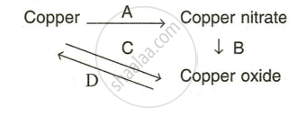Advertisements
Advertisements
Question
How is nitric acid prepared in laboratory?
Solution
In laboratory, nitric acid is prepared by heating a mixture of concentrated sulphuric acid and potassium or sodium nitrate with Conc. H2SO4 at 200°C.
\[\ce{KNO3 + H2SO4 -> KHSO4 + HNO3}\]
APPEARS IN
RELATED QUESTIONS
What is the type of salt formed when the reactants are heated at a suitable temperature for the preparation of Nitric acid?
Write equation for the following conversions A, B, C and D.

Can we use conc. HCl in place of Conc. H2SO4 ?
Write the equations involved in Ostwald process.
Brown ring disappear if the test tube is disturbed.
Fill in the blank with appropriate word/words.
Aqua regia is a mixture of _______ and________
Write a chemical equation to illustrate the acidic nature of nitric acid.
Explain the following:
Dilute nitric acid is generally considered a typical acid but not so in its reaction with metals.
X, Y, and Z are three crystalline solids that are soluble in water and have common anion.
To help you to identify X, Y and Z, you are provided with the following experimental observations. Copy and complete the corresponding inferences in (a) to (e).
- A reddish-brown gas is obtained when X, Y, and Z are separately warmed with concentrated sulphuric acid and copper turning added to the mixture.
INFERENCE 1: The common anion is the ______ ion. - When X is heated, it melts and gives off only one gas which re-lights a glowing splint.
INFERENCE 2: The cation in X is either ______ or ______. - The action of heat on Y produces a reddish-brown gas and yellow residue which fuses with a glass of the test tube.
INFERENCE 3: The metal ion present in Y is the ______ ion. - When Z is heated, it leaves no residue. Warming Z with sodium hydroxide solution liberates a gas which turns moist red litmus paper blue.
INFERENCE 4: Z contains the ______ cation. - Write the equations for the following reactions:
- X and concentrated sulphuric acid (below 200°C). (One equation only for either of the cations given in INFERENCE 2)
- The action of heat on Y.
- Concentrated nitric acid is added to copper turnings kept in a beaker.
Explain why nitric acid is kept in a reagent bottle for a long time.
